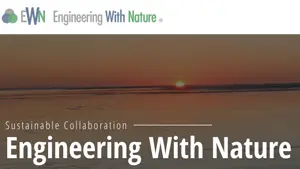 The U.S. Army Corps of Engineers (USACE) Engineering With Nature® (EWN) Initiative enables more sustainable delivery of economic, social, and environmental benefits associated with infrastructure.
The U.S. Army Corps of Engineers (USACE) Engineering With Nature® (EWN) Initiative enables more sustainable delivery of economic, social, and environmental benefits associated with infrastructure.
Engineering With Nature® is the intentional alignment of natural and engineering processes to efficiently and sustainably deliver economic, environmental, and social benefits through collaboration.
Moving Towards Sustainable Practices
Sustainable water resources infrastructure is achieved through the beneficial integration of engineering and natural systems. With recent advances in the fields of engineering and ecology, there is an opportunity to combine these fields of practice into a single collaborative and cost-effective approach for infrastructure development and environmental management.
Triple-win outcomes are achieved throughout EWN by systematically integrating social, environmental, and economic considerations at every phase of a project. The results are innovative and resilient solutions that are more socially acceptable, viable and equitable, and, ultimately, more sustainable.
Key Elements
Use science and engineering to produce operational efficiencies supporting sustainable delivery of project benefits.
Use natural processes to maximum benefit, thereby reducing demands on limited resources, minimizing the environmental footprint of projects, and enhancing the quality of project benefits.
Broaden and extend the base of benefits provided by projects to include substantiated economic, social, and environmental benefits.
Use science-based collaboration to organize and focus interests, stakeholders, and partners to reduce social friction, resistance, and project delays while producing more broadly acceptable projects.
Click here to view the resource.




